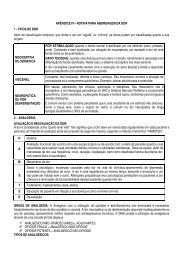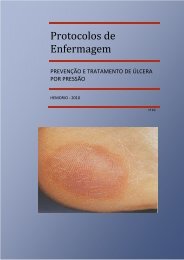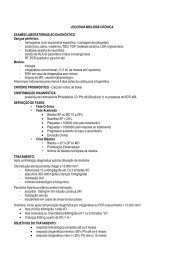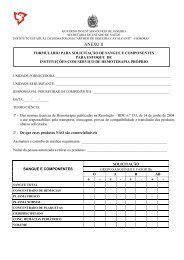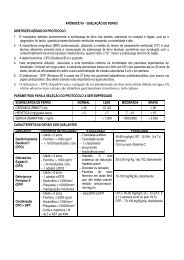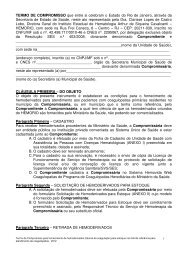Protocols - Hemorio
Protocols - Hemorio
Protocols - Hemorio
Create successful ePaper yourself
Turn your PDF publications into a flip-book with our unique Google optimized e-Paper software.
- Currently there is a tendency to perform prophylactic cholescystectomy by laparoscopy in asymptomatic<br />
patients, with purpose of prevent possible pictures of cholecystitis, or colangitis and/or the necessity of<br />
urgency surgery. The occurrence of inflammatory/infectious pictures may also difficult the future use of<br />
videolaparoscopy due to viscosity formation.<br />
- Pre-surgical preparation at Hemotherapy discretion. Due to possible complications during surgery, the<br />
patient, previously conducted to videolaparoscopy, may be submitted to laparotomy and respiratory<br />
physiotherapy with spirometer.<br />
- Post-surgical cares – respiratory physiotherapy with spriometer and early walking around (prevention of<br />
STA and vase-occlusive).<br />
15. HEPATITIS:<br />
After the diagnose by confirmatory test, conduct patients to a Reference Centre for treatment. Note.:<br />
RIBAVIRIN is not at MS protocol for DF, because its use in these patients are not established yet.<br />
16. RENAL COMPLICATIONS<br />
HYPOSTHENURIA: Caused by the difficulty of the kidney to concentrate the urine. It is noted around 3<br />
years old. This condition results a mandatory urinary output of more than 2.000ml/day, in adults. The<br />
increase of urinary loss becomes patient more likely to dehydration, which is a precipitate factor of vaso -<br />
occlusive crisis. Hyposthenuria also leads to nocturia in adult and persistent enuresis in children.<br />
Conduct: to provide from 3 to 5 ml/day to adults and 150ml/Kg/24h to children.<br />
NOCTURNAL ENURESIS (No need to treatment until 5 years old)<br />
- As of 5 years old:<br />
1. Avoid ingestion of liquids near bedtime<br />
2. To make conscious bladder control (training to hold urine for a longer period, urinate intermittently, urine<br />
before bedtime)<br />
3. Drug treatment: Imipramine - 25mg/day – adult and 10mg/day- children<br />
ATTENTION: Conduct to Nephrology ALL patients that experience any of the changes described below.<br />
RENAL TUBULAR DYSFUNCTION:<br />
1 Unable to acidificate urine. It may lead to metabolic acidosis (Start therapy with Sodium Bicarbonate)<br />
2 Hyperkalemia (Higher risk of hyperkalemia in patients using beta-blockers, ACE blockers or Potassiumsparing<br />
diuretic). The drug must be withdrawn.<br />
29



